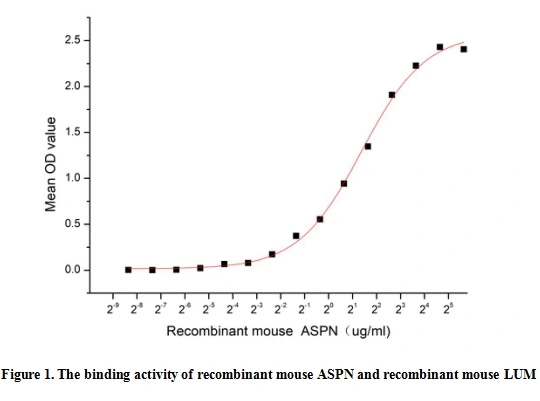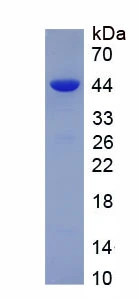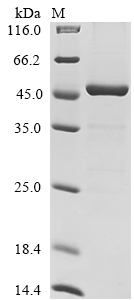
ELISA analysis of GTX00331-pro Mouse Asporin protein, His tag which can bind recombinant Mouse Lumican/LUM Protein.
Mouse Asporin protein, His tag
GTX00331-PRO
ApplicationsFunctional Assay, Other Application
Product group Proteins / Signaling Molecules
Protein IDQ99MQ4
Overview
- SupplierGeneTex
- Product NameMouse Asporin protein, His tag
- Delivery Days Customer9
- Application Supplier NoteAsporin (ASPN) is a protein belongs to a family of leucine-rich repeat (LRR) proteins implicated in cancer, osteoarthritis, and periodontal ligament mineralization. The protein negatively regulates chondrogenesis in the articular cartilage and periodontal ligament (PDL) differentiation, inhibits BMP2-induced cytodifferentiation of PDL cells and also nhibits the interaction between TGFB1 and TGF-beta receptor type II in the presence of heparin/heparan sulfate in vitro. In addition Lumican (LUM) and ASPN can contribute to the fibrinogenesis of cardiac remodeling of ICM, thus a binding ELISA assay was conducted to detect the interaction of recombinant mouse ASPN and recombinant mouse LUM. Briefly, ASPN were diluted serially in PBS, with 0.01% BSA (pH 7.4). Duplicate samples of 100 microl were then transferred to LUM-coated microtiter wells and incubated for 2h at 37C. Wells were washed with PBST and incubated for 1h with anti-ASPN pAb, then aspirated and washed 3 times. After incubation with HRP labelled secondary antibody, wells were aspirated and washed 3 times. With the addition of substrate solution, wells were incubated 15-25 minutes at 37C. Finally, add 50 microL stop solution to the wells and read at 450 nm immediately. The binding activity of recombinant mouse ASPN and recombinant mouse LUM was shown in the Figure, the EC50 for this effect is 2.6 ug/mL.
- ApplicationsFunctional Assay, Other Application
- CertificationResearch Use Only
- ConjugateUnconjugated
- Protein IDQ99MQ4
- Protein NameAsporin
- Scientific DescriptionThis gene encodes a member of the small leucine-rich proteoglycan family. The encoded protein is an extracellular matrix protein that modulates the transforming growth factor-beta signaling pathway, regulating cartilage matrix gene expression and cartilage formation. The protein plays a role in the pathology of osteoarthritis. Alternative splicing results in multiple transcript variants.[provided by RefSeq, Feb 2010]
- Storage Instruction-20°C or -80°C,2°C to 8°C
- UNSPSC12352202


